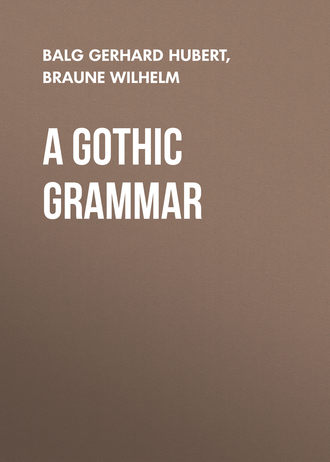 полная версия
полная версияA Gothic Grammar
Note 3. All ordinals except 1st and 2nd (cp. § 146), and the prns. sama and silba (§ 156) follow the weak inflection only.
Note 4. Lastly, the prs. ptcs. (§ 133), comparativs (§ 136), and the superlativs in -ma (§ 139) inflect exclusivly like weak adjs. But all these words hav the f. according to the paradim managei (§ 113, n. 3).
C. DECLENSION OF THE PARTICIPLS
§ 133. The present participl has lost its strong inflection and declines like a weak adj., but with the f. in -ei (§ 132, n. 4). Only the nom. sg. m. has frequently both the strong and the weak inflection. Paradim gibands, giving:
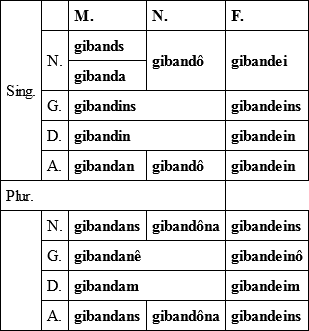
Note 1. Concerning the shorter inflection of sum participls uzed substantivly, s. § 115.
§ 134. The prt. ptc. pass., like an ordinary adj., follows the strong and weak inflection; e. g., the pp. of the stv. giban:

The pp. of the wv. nasjan:

Note. Concerning the interchange between þ and d in the pp. of the weak verbs, s. § 74.
D. COMPARISON OF ADJECTIVS
1. COMPARATIV§ 135. The comparativ degree of adjectivs in Gothic is formd by means of two suffixes, -iz- and -ôz-, to which the terminations of the weak adjectivs ar added.
The formation with the suff. -iz- is more general than the other. It is found in adjs. of all kinds; e. g., managiza (< manags, a-stem), alþiza (< alþeis, §§ 127. 128), hardiza (< hardus, § 131). – But the suffix -ôz- occurs in a-stems only: frôdôza (< frôþs), swinþôza (< swinþs).
Note. The adj. juggs, yung, has the compar. jûhiza (according to § 50, n. 1). Its superlativ is not extant.
§ 136. The comparativs inflect exactly like weak adjectivs, but the f. ends in -ei (§ 132, n. 4):

etc., like the prs. ptc. (§ 133).
2. SUPERLATIV§ 137. The superlativ degree, like the comparativ, is formd in two ways, in -ist- or in -ôst-; e. g., managists (< manags), armôsts (< arms, poor). The inflection of the superlativs is precisely the same as that of ordinary adjectivs – strong and weak.
Note. No rule can be givn for the appearance of the ô or the i in the suffix, except that the ô-form occurs only with a-stems. We may suppose that a word which forms the compar. by means of i, has i in the superl. also, and that, in like manner, the ô-forms correspond to each other. This supposition, however, is only founded on a few extant exampls.
3. IRREGULAR COMPARISON§ 138. The lack of comparison of sum adjectivs is supplied by comparativs and superlativs with a corresponding meaning, but without a positiv:
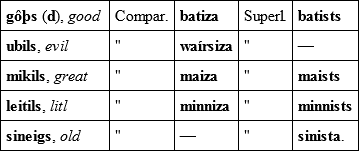
§ 139. A superlativ with an m-suffix is found in six words, which ar derived from adverbial stems and appear without a positiv. The m-suffix is either simpl: fru-ma, innu-ma, aúhu-ma, or compound: af-tuma, if-tuma, hlei-duma.
Two of them hav assumed a comparativ meaning: aúhuma, higher; hleiduma, left (ἀριστερός); the others hav a superlativ or an intensiv signification: aftuma, the last; iftuma, the next; innuma, the inmost; fruma, the first.
These words follow the weak inflection, but hav the f. in -ei, exactly like the comparativs.
Note. Sum superlativs in -ma ar compared anew in the uzual manner: aftumists, the last; aúhumists, oftener than aúhmists (cp. OE. ŷmest, Sievers-Cook, OE. Gr., § 314, n. 3), the highest; frumists, the first. – The forms hindumists, hindmost, spêdumists, last (< *spêþs, beside spêdiza, spêdists), suggest the missing hinduma and spêduma. Also miduma, midst, midumônds, mediator, point to a form *miduma, midl (cp. OE. meodume, midmest).
CHAP. III. NUMERALS
1. CARDINALS
§ 140. The first three numerals ar declinabl in all cases and genders.
1. ains, n. ain and ainata, f. aina, inflects entirely like a strong adj. (blinds, § 123). Plural forms mean only, alone. No weak inflection is found. (§ 122, n. 1).
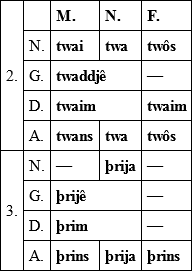
The nom. of the m. and f., which is not extant, may with certainty be givn as þreis.
Note. The definit dual number 'both', ἀμφότεροι, is renderd by bai, which inflects like twai. The extant forms ar nom. m. bai, dat. baim, acc. bans, nom. acc. n. ba. – There occurs also an extended form with the same meaning, its inflection being that of a consonantal substantiv (§ 117, n. 4): nom. bajôþs, dat. bajôþum.
§ 141. The numerals from 4 to 19 ar of one gender. Extant ar: fidwôr, 4; fimf, 5; saíhs, 6; sibun, 7; ahtau, 8; niun, 9; taíhun, 10; ainlif (§ 56, n. 1), 11; twalif, 12; fidwôrtaíhun, 14; fimftaíhun, 15. These numerals ar uzed uninflected, but may take an inflected gen. and dat. according to the i-declension (§ 99 et seq.). Thus, fidwôr, dat. fidwôrim; niun, gen. niunê; taíhun, dat. taíhunim; ainlif, dat. ainlibim; twalif, gen. twalibê, dat. twalibim.
Note. For fidwôr appears fidur- (s. § 24, n. 2) in cpds.: fidurfalþs, fourfold; fidurdôgs, time of four days; fidurragineis, tetrarch. Cp. Beitr., 6, 394; Brgm., III, 11.
§ 142. The tens from 20 to 60 ar formd by means of the pl. tigjus (< *tigus, a decad), preceded by the units. tigjus inflects regularly like sunus (§ 104). The object counted is always givn in the gen. —twai tigjus, 20; *þreis tigjus, 30 (extant in gen. þrijê tigiwê, acc. þrins tiguns), fidwôr tigjus, 40; fimf tigjus, 50; saíhs tigjus, 60.
§ 143. From 70 to 100 -têhund takes the place of tigjus: sibuntêhund, 70; ahtautêhund, 80; niuntêhund, 90; taíhuntêhund and taíhuntaíhund, 100. The numerals in -têhund ar substantivs which ar as a rule indeclinabl. Onse (Lu. XV, 7) we meet with an inflected gen. sg.; in niuntêhundis jah niunê garaíhtaizê. – Cp. Brgm., III, 40.
§ 144. The hundreds ar formd by means of the plural of a neuter hund (a hundred). The following ar extant: twa hunda, 200; þrija hunda, 300; fimf hunda, 500; niun hunda, 900.
§ 145. þûsundi, 1000, is a f. sb. (inflecting like bandi, § 96), with a gen. pl.; several thousands ar exprest by þûsundjôs. – Onse (Ezra II, 14) occurs a n. pl. twa þûsundja. Cp. ahd. gr., § 275. OE. Gr., § 327, and Mahlow, 'Die langen Vocale', p. 98.
The extant thousands ar: twôs þûsundjôs, 2000; .g. þûsundjôs, 3000; fidwôr þûsundjôs, 4000; fimf þûsundjôs, 5000; taíhun þ., 10000; miþ twaim tigum (dat.) þûsundjô (gen.), with 20000.
Note (to §§ 141-145). The numerals ar very often denoted by letters (cp. § 1, n. 2). Therefore so many words for numerals ar wanting.
2. ORDINALS
§ 146. The first two ordinals differ in point of stem from the corresponding cardinals. 1. m. fruma, n. frumô, f. frumei (s. § 139), and the superl. frumists, first (§ 139, n. 1). 2. anþar, second, other, inflects like a strong adj. (§ 122, n. 1; § 124, ns. 1. 4). – All subsequent ordinals ar derived from the cardinals and inflect like weak adjectivs (§ 132, n. 3). The extant ordinals ar: þridja, 3d; *fimfta (only in 15th), fifth; saíhsta, 6th; ahtuda, 8th; niunda, 9th; taíhunda, tenth; fimftataíhunda, 15th. Only the second component is declined: dat. sg. (in jêra) fimftataíhundin; Lu. III, 1.
3. OTHER NUMERALS
§ 147. A distributiv numeral is tweihnai, two apiece, two-and-two, extant in the dat. f. tweihnaim and acc. f. tweihnôs.
Note. All other distributivs ar exprest by means of the cardinals along with ƕazuh, ƕarjizuh (§§ 164. 165) or the prep. bi; as (insandida ins) twans ƕanzuh, two and two; Lu. X, 1; bi twans; I. Cor. XIV, 27.
§ 148. Multiplicativs ar formd by means of the adj. falþ-: ainfalþs, onefold; fidurfalþs, fourfold; taíhuntaíhund-falþs, hundredfold; managfalþs, manifold.
§ 149. Numeral adverbs answering the question 'how many times', 'how often'? ar exprest by the dat. sg. sinþa or by the dat. pl. sinþam (nom. sg. sinþs, time, lit. 'a going') preceded by the cardinals: ainamma sinþa, onse; twaim sinþam, twice; þrim sinþam, thrice; fimf s., five times; sibun s., seven times. – With an ordinal numeral: anþaramma sinþa, a second time.
Note. Also the n. þridjô, a third time, is uzed adverbially (II. Cor. XII, 14).
CHAP. IV. PRONOUNS
1. PERSONAL PRONOUNS WITHOUT GENDER (REFLEXIV)
§ 150.
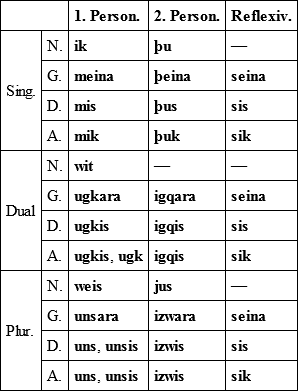
Note 1. ugkis, igqis, etc., are also speld uggkis, iggqis; cp. § 67, n. 1.
Note 2. The nom. du. 2nd pers. is not extant; it was undoutedly jut. For jus (jûs?), s. § 15, n. 1.
§ 151. From the stems of these pronouns adjectivs ar derived, the so-calld possessiv pronouns. 1st pers.: m. meins, n. mein, meinata; f. meina, my (mine); 2nd pers.: þeins, thy (thine); refl. seins, his. Plurals: 1st pers. unsar, our; 2nd pers. izwar, your. The only extant dual poss. prn. is igqar, the 1st pers. would be ugkar.
Note 1. The inflection of these pronominal adjectivs is identical with that of the strong adj.; concerning unsar, izwar, cp. § 124, ns. 1 and 4. – No weak inflection occurs.
Note 2. The reflexiv *seins occurs only in the gen., dat., acc.; insted of the nominativs of all genders and numbers the genitivs of the prn. of the 3d pers. (is, izôs; izê, izô; § 152) ar employd.
2. PRONOUNS OF THE THIRD PERSON
§ 152.
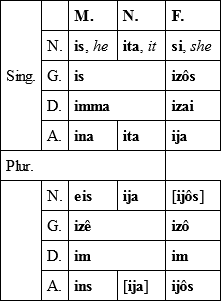
Note. The acc. and gen. pl. n. and the nom. pl. f. ar not extant, but the inferd forms ar undoutedly correct.
3. DEMONSTRATIV PRONOUNS
§ 153. The simpl dem. prn. sa, sô, þata is uzed both as dem. prn., this, that (for the Gr. οὗτος or αὐτός), and, with a weakend force, as articl, the. The latter uze is predominant. – The neuter sing. (like the interrog., § 159) has preservd the instrumental case.
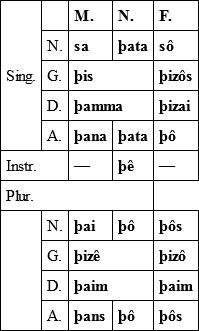
Note 1. The final as of the dissyllabic forms ar dropt in combination with enclitics beginning with a vowel; cp. § 4, n. 1. – For þei from *þa-ei, s. § 157, n. 2.
Note 2. The instr. n. þê is preservd only in the combinations bi-þê, du-þê (duþþê), jaþ-þê (§ 62, n. 3), þêei (§ 157, n. 1), and, like þana (in þanamais, þanaseiþs), before a comparativ (= E. 'the' in 'the more').
§ 154. A compound demonstrativ pronoun is formd by affixing the enclitic particl -uh to the simpl demonstrativ. Cp. § 24, n. 2. Its meaning is always that of the simpl sa uzed demonstrativly, this, that (= Gr. οὗτος or αὐτός). – It inflects thus:
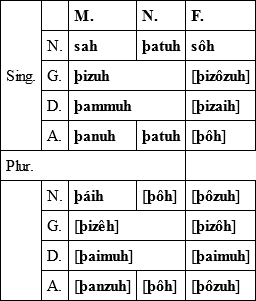
Note 1. The forms in square brackets ar not extant.
Note 2. The instr. n. þêh occurs only in the adv. bi-þêh.
§ 155. A defectiv demonstrativ pronoun hi- (nom. *his = is, § 152), this, occurs only in temporal frases in the dativ m. and n. himma and in the acc. m. hina, n. hita; e. g., himma daga, to-day; und hina dag, to this day; und hita, til now.
§ 156. jains (concerning the vowel ai, cp. § 20, n. 4), n. jainata, f. jaina (yon), that, inflects like a strong adj. (blinds, § 124).
Like weak adjectivs inflect silba, self, and sama, same, or with the articl: sa sama, the same (cp. § 132, n. 3).
4. RELATIV PRONOUNS
§ 157. A simpl relativ pronoun is not found in the Gothic language. A relativ prn. of the 3d pers. is formd from the simpl demonstrativ pronoun by affixing the particl ei which, when uzed independently, has the force of a conjunction, that, in order that. This relativ pronoun inflects as follows:
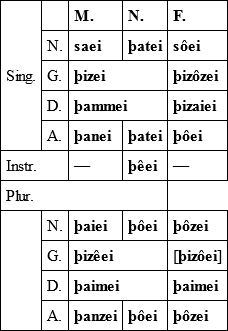
Note 1. The instr. n. þêei is uzed only as a conjunction.
Note 2. Beside þatei occurs þei, which is employd, however, only in combination with ƕah (§ 164, n. 1), and (like þatei) as a conjunction, that. Cp. Beitr., 4, 467; 6, 402; Zs. fda., 29, 366 et seq.
Note 3. Insted of the nom. sg. saei, m., sôei, f., also izei, m., sei (i. e. si-ei, § 10, n. 2), f., (formd from the 3d pers. of the pers. prn., § 152) ar employd. The form sei occurs even more frequently than sôei. Sumtimes izei stands as nom. pl. m. (for eizei which is not found); e. g., þai izei bimaitanai sind; Gal. VI, 13. – For izei the form izê is often found; cp. § 17, n. 1.
Note 4. Concerning the change of final s before ei into z, s. § 78, c.
§ 158. When a relativ clause refers to a prn. of the 1st or 2nd pers., the relativ particl is affixt to the respectiv pers. prn. Thus, ikei, who (1st pers. sg.); —þuei, who; þuzei, to whom (as in Mk. I, 11); þukei, whom (2nd pers. sg.); —juzei, who; izwizei, to whom (2nd pers. pl.).
5. INTERROGATIV PRONOUNS
§ 159. The interrogativ pronoun ƕas, who? (= Lt. quis), is formd from the simpl interrogativ stem ƕa-. A substantiv following ƕas occurs always in the genitiv; e. g., ƕa mizdônô, τίνα μισθόν; Mt. V, 46.
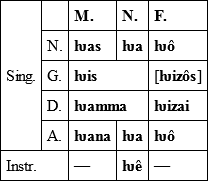
Note 1. The gen. f. is not extant. The instr. occurs only in the neuter (cp. sa, § 153).
Note 2. ƕas has no plural; cp. however ƕanzuh, § 164, n.
Note 3. ƕas is also employd as an indefinit prn.; cp. § 162, n. 2.
§ 160. From stem ƕa- ar derived: ƕaþar, which of two?, and ƕarjis, which? A substantiv following is always put in the gen. Both words inflect like strong adjectivs —ƕaþar like anþar (cp. § 124, n. 1), ƕarjis like midjis (§ 125), f. ƕarja, the n. *ƕarjata like ƕarjatôh (§ 165).
§ 161. Compound interrogativs: ƕileiks, what sort of?, 'qualis?' (its correlativ being swaleiks, such, 'talis'), and ƕêlauþs, f. ƕêlauda, how great?, 'quantus?' (correlativ swalauþs, so great, 'tantus'). These words inflect like a strong adjectiv.
Note. ƕeleiks (in Lu. I, 29), for ƕileiks, is probably miswritn (according to § 10, n. 5).
6. INDEFINIT PRONOUNS
§ 162. The Goth. indefinit pronoun sums, f. suma, n. sum, sumata, sum (Gr. τις, τι), inflects like a strong adjectiv and is uzed adjectivly; with the meaning sum one, a certain one, it is also uzed substantivly.
Note 1. An enumerativ expression is sums…sums (= Gr. ὁ μέν…ὁ δέ). In most cases uh (§ 24, n. 2) is added to the second sums, occasionally also to the first; as, sumai…sumáih, or sumáih…sumáih, sum … others.
Note 2. Also the interrogativ ƕas (§ 159) is very often uzed as an indefinit prn., anyone.
§ 163. The enclitic particl -hun is uzed to form indefinit pronouns which occur only with the negativ particl ni. Their meaning is no one, none.
(a) The singular of manna, man (§ 117), with the suffix -hun means no one. – The extant forms ar:
n. ni mannahun, d. ni mannhun, g. ni manshun, acc. ni mannanhun.
(b) ni ƕashun (< ƕas, § 159), uzed substantivly, no one. It occurs in the nom. sg. m. only. – An analogon to ƕashun is ƕanhun (< ƕan, § 214, n. 1).
(c) ni ainshun, the commonest indef. prn., is uzed substantivly (no one, none) and adjectivly (no, not any). A following sb. occurs always in the (partit.) gen.; e. g., ni ainshun þiwê, no servant; Lu. XVI, 3. – The declension of ainshun differs in sum cases from that of the simpl form ains (§ 140).
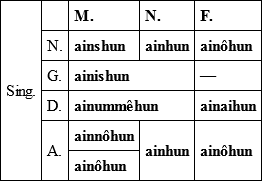
Note. -hun is also affixt to the acc. sg. of the sb. ƕeila (§ 97, n. 2): ƕeilôhun, for an hour (ni ƕeilôhun, οὐδὲ πρὸς ὥραν; Gal. II, 5).
§ 164. 'Every' is renderd by affixing -uh to the interrogativ pronouns.
(a) ƕazuh, every. A noun or prn. following takes the gen. Its inflection differs in part from that of the simpl form ƕas (§ 159):
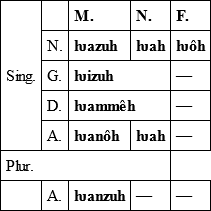
In the pl. only the acc. ƕanzuh occurs.
Note 1. The indef. relativ 'whoever, whosoever' (Lt. quicunque) is renderd: (1) by ƕazuh saei or, with sa prefixt, saƕazuh saei. For saei also izei is found (§ 157, n. 3). – These forms ar uzed in the nom. sg. only, the nom. n. þataƕah þei (þei = þatei, § 157, n. 2) occurs twice: Jo. XV, 7. 16. – (2) by þisƕazuh followd by saei or ei in all cases; the first component, þis, remains uninflected: m. n. þisƕazuh saei, dat. þisƕammêh saei, acc. þisƕanôh saei; – nom. acc. n. þisƕah þei (or þatei), gen. þisƕizuh þei, dat. þisƕammêh þei.

